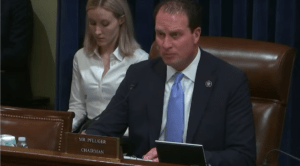The Federal Bureau of Investigation (FBI) faced a tense backlash from House Republicans during a May 23 Homeland subcommittee hearing. The hearing, which was titled “Assessing the U.S. Homeland’s Vulnerabilities to Chinese Communist Party Aggression” quickly turned into condemnation for the politicization of the FBI over the last few years, often making them look more like the Keystone Cops than a serious, apolitical law enforcement body. Criticism was levied on both the FBI and the Department of Homeland Security for their questionable success in stopping China’s corporate espionage and influence-peddling operations in the U.S. There was a sense of “where are you” in last week’s House Homeland Security Subcommittee on Counterterrorism, Law Enforcement, and Intelligence, led by Chairman August Pfluger (R-TX).
For sure, two of the witnesses from the FBI and Homeland Security were aware of the China crisis and what it meant to American businesses.
“When it comes to economic espionage, the Chinese government uses every means at its disposal against us,” said Jill Murphy Deputy Assistant Director of Counterintelligence at the FBI. “They blend cyber, human, diplomacy, corporate transactions, and pressure on U.S. companies operating in China to achieve its strategic goals to steal our companies’ innovations. China not only uses human intelligence officers, co-optees, non-traditional collectors and corporate insiders, but also shell game corporate transactions and joint venture partnerships that are anything but a true partnership. There’s nothing traditional about the scale of their theft. It’s unprecedented.”
Iranga Kahangama, Assistant Secretary for Cyber, Infrastructure, Risk and Resilience at the Department of Homeland Security called China “our only competitor” with both the intent to reshape the international economic system. Kahangama said China uses economic, diplomatic, military, and its version of Big Tech to win hearts and minds. And “in cyberspace, our interconnectedness and the technology that enables it exposes us to a dynamic and evolving threat that Beijing actively exploits.”
The FBI and Homeland know China is a big problem. They were taken to task by the Committee on what they planned on doing about it. Despite some Democrats singing the FBIs praises, they were hard-pressed to get results on its ability to slow China’s espionage activities down in any meaningful way. The numbers presented made it look like the situation is actually getting worse.
Both political parties know this, too.
“It is indisputable that the Chinese Communist Party is the United States’ greatest competitor on the world stage,” said the Subcommittee Ranking Member Seth Magaziner (D-RI). “It is also indisputable that the CCP is actively trying to undermine the economy and security of the United States.”
In November 2018, the Department of Justice launched the China Initiative to raise awareness and to identify and prosecute Chinese trade secret theft and economic espionage, and to protect American critical infrastructure and supply chains from CCP’s malign influence. In February 2022, the Department of Justice ended the China Initiative.
The CCP has orchestrated the theft of anywhere between $225 and $600 billion in intellectual property annually, according to the Commission on the Theft of American Intellectual Property. Bill Evanina, former director of National Counterintelligence and Security Center, told the Committee back in March that this equates to nearly $4,000 to $6,000 stolen per American family of four after taxes.
The China Initiative was established to address some of the most critical threats to national security posed by the CCP. It found that about 80 percent of all federal economic espionage prosecutions have alleged conduct that would benefit the Chinese state. About 60 percent of all U.S. trade secret theft cases have had a nexus to China.
The FBI got blamed for being weak on China, and not knowing enough about the situation on the ground. When confronted with the numbers from the China Initiative, the FBI’s Murphy said she didn’t know what the numbers were, but that she did not doubt they were that high.

Chairman Pfluger to FBI: Way too many unanswered questions from the Department of Justice and Homeland Security on China.
Chairman Pfluger asks Murphy, who out of the three witnesses received the bulk of the questioning, whether or not it was true that the FBI has a China spy investigation launched almost once a day. Murphy said she didn’t know about that either, but added that “China is probably half of the work that we do in counterintelligence.” Murphy said the FBI has over 2,000 active cases involving China IP theft and espionage.
Sometimes Murphy said she could only comment off the record. Pfluger asked her, for example, if any of those active cases involved influence peddling. She said she could only answer behind closed doors.
“I think that the American people are having a hard time with the Department of Justice right now because of answers to questions like this,” a flustered Pfluger said to her. “This is very simple. Ask a thousand people in our country this same question, and they’re going to say, of course they’re trying to do that.”
Rep. Eli Crane (R-AZ) asked Murphy about ‘elite capture’, a term often used by China hawks that means U.S. elite institutions and its top managers are too linked to China to ever try to make things harder for China.
Murphy said she never heard of the term.
“Elite capture is used by the CCP as a form of political warfare that seeks to control the actions of political, academic, business, and cultural leaders outside of China to benefit the CCP,” Crane said, not believing the FBI never heard the time. “The means of control take a variety of forms, including financial incentives, financial dependence, or compromise business entanglements, offers of access to opportunities within China, ideological appeal, and even blackmail. Are you familiar with these techniques, ma’am?”
By the end of the hearing, it was Homeland’s turn to say what they were doing.
Magaziner asked Kahangama to sum up their strategy to stop China IP theft, among other things.
Kahangama said Homeland is undergoing a “90-day sprint” which involves a department-wide focus on six key areas to counter the threat from China.
This includes countering economic coercion, their role in the fentanyl crisis, and even going so far as to counter their activities in the Arctic.
In the end, it seemed no one on the Committee was left with any feeling that the China threat has moved on from proper assessment to actual solutions, including prosecutions of bad actors.
The assessment of the dangers to U.S. manufacturing is clear. Murphy laid it out early in the hearing, with a focus on new technologies, green tech, and new pharmaceutical products.
“The Chinese government makes American ventures operating in China establish Chinese community party cells within their companies,” Murphy said in her opening statement. “The companies operating in China are susceptible to the laws and regulations of the Chinese government, which enables it to steal U.S. corporate information and technology. The American people and businesses should know… if you’re an owner of a company, or a security official, or an employee of a U.S. business, no matter the size, and you are creating cutting-edge technology in the semiconductor, quantum computing, or AI space; if you are involved in clean energy projects, or in biotech, or in aerospace, or in robotics, the list goes on…then your company’s intellectual property and employees are targets of sophisticated nation-state actors from China China, who are located both here in the United States and abroad.”













